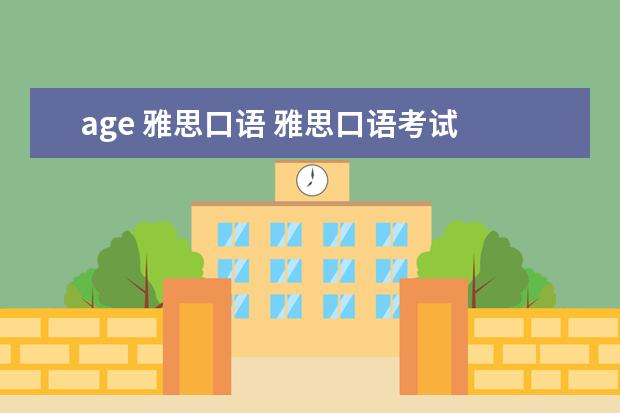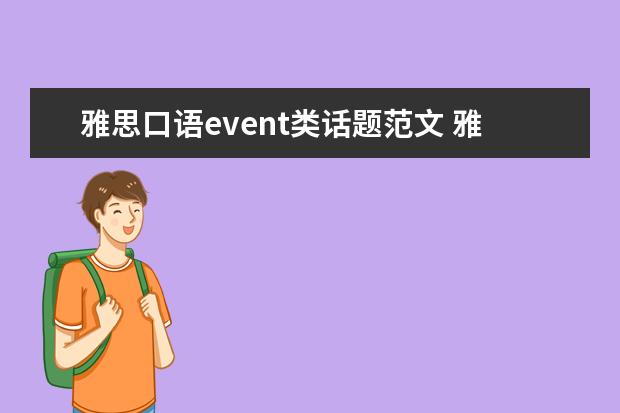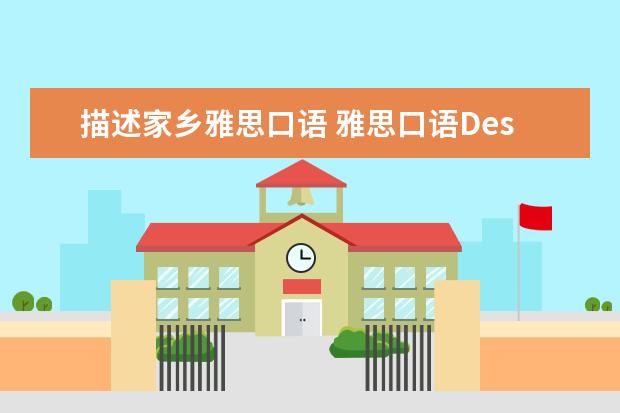雅思考试主要是通过对考生听、说、读、写四个方面英语能力的考核,综合测评考生的英语沟通运用能力,实现“沟通为本”的考试理念。对于雅思考生来说,也有很多考试难点和政策盲区需要帮助解答。今天雅思无忧网小编准备了雅思口语age话题 雅思口语考试 Part 2 Describe a historical event/...,希望通过文章来解决雅思考生这方面的疑难问题,敬请关注。

雅思口语part2要准备哪些话题
喜好:动物;运动;音乐;电影;电视节目;摄影;阅读;菜肴
物品:邮件;服装;广缓察告;扰岁茄珠宝;发明;玩具;手工艺品
人物:老人;小孩;体育明星;老师;朋友;同事;邻居;家庭成员;冒险家;成功的人
地点:住所;学校;购物中心;历史名胜;想去的国家;自然景观;理想的房子;河流
人生经历:网站和网上购物经历;一次成功;人生中的一次重要的改变;雀乱参加过的婚礼
雅思口语考试 Part 2 Describe a historical event/...
雅思口语Part 2答题技巧
策略一:WH细节描述法
当考生或乱在面对话题无从下手时,可以利用 ”WH Questions”来引导思路的拓展,包括 “what, when, where, who(whom), why, how (how exactly, how often, how long, how much, how many)”。
例如,Describe a restaurant or cafe you like. 首先须明确what(the Bookworm),when(some five years ago), where (down the south of Chengdu),who(foreigners for most of time);其次是整个描述的重点why(comfortable, pleasant, intimate ),how exactly (detailed description of being comfortable, pleasant, and intimate),how often(once a month…),how much(30-40 yuan on average per person),how many(3 in Whole China)。
但是,在此提醒考生,在回答中,不可机械地按照每一个WH来作答,否则描述同样会非常死板乏味,即需要灵活自然过渡每一个WH。
策略二:举例支撑法
在Part 2话题描述中,如果仅有描述,仍会让整个陈述略显有些平淡,判雹建议考生在描述的同时加上相应的例子,这样可以大大增加描述内容的丰富性和生动性。但是, 在Part 2里例子,并不一定要非常正式的举例,如“For example”;口语化的一些表达方式会更自然一些,如“such as,like”。比如,”Describe a special shop”,除了描述这个shop里有一些special goods外,若再具体举例说明有哪些特殊商品可以更能增强生动性。In the shop, you can always find some special and interesting stuff, such as hand-made floating lantern, photo books, tiny china pot, and Nepali jewelries and things like that。
策略三:数据支撑法
Part 2话题属于细节描述题,在适当的时候如果能够使用数据来进一步支撑描述,可以增强话题掘团帆描述的真实性和说服力。但是,建议考生在使用数据的时候不要太过夸张数字,而且频率不应过多,使用一次数据就可以了。另外,与雅思写作有别的是,在写作中引用数据时最好有个出处或来源,但在回答口语Part 2问题时,这个出处可以省略,否则会导致回答内容是背诵的嫌疑,降低真实性,这就与我们的初衷背道相驰了。
更多雅思相关咨询请登陆新航道官网:
http://www.xhd.cn/
雅思口语考试话题必备句子之老人话题?
关于老年人的雅思口语话题
雅思口语平时要多练,什么话题都能说一点,临考才不会心里没底而慌乱,老年人话题虽然不难,但是有些题目比较生僻,我们得让知识无死角。例如美国老年人的话题,如果我们对美国老年人的生活槐销不是很了解到话,这个话题就会很难。
老人在中国和西方的生活:
It a common tradition in China that children live together with their
parents until they are married, and often children still live with the parents
after they are married.
在中国,孩子们结婚前一直与父母生活在一起是很普遍的,许多人婚后仍和父母共同生活。
In China the grandparents stay on with the family and look after the
grandchildren while the parents are at work.
中国的祖父母铅仿游一直和全家人住在一起,儿女们一起去上班时的时侯,他们照看孙子孙女们。
In North America, old people usually live alone. If they are too old to
take care of themselves, or if they’re really old, day over 75, then they
usually live in old-folk’s homes, nursing homes, or special apartment complexes
designed for senior people.
在北美,老人们一般是单独生活。如果他们年纪太大生活不能自理,或者已逾古稀之年大大,比如说过了75岁了,他们便住进老人院、疗养院或专为老年人设计建造的有综合设施的公寓。
I do think that living together with the parents when we marry would be
nice for the child’s stability and would also let the parents feel like an
important part of the family.
我的确认为何老人们共同生活可以使孩子有稳定感,同时也让老人们觉得自己仍是家庭的重要成员。
It looks like it depends on how rich a family is weather to live with the
parent when we marry or not.
婚后是否与父母一起生活似乎要看一个家庭的富有程度。
That’s the trouble in some cases. Living with people of different
generations isn’t always easy. It requires some sacrifices and tolerance of
other’s behavior.
在有些情况下,那也很麻烦。几代人一起生活并不总是很容易相处的,这需要做出几点牺牲,并能宽容别人的行为。
In China it’s often the mother-in-law and the daughter-in-law who don’t get
on well enough, until both sides agree to live apart. And it’s socially
acceptable if the younger couple help the old couple in ways that are necessary.
Well, for example, when the parents are strong enough to live on their own the
children are expected to help when needed. When the parents are too old to take
care of themselves, they should be moved back to the children’s home where they
are properly fed, clothed and sheltered.
在中国经常是婆媳关系不好,只要双方同意分家。社会也能接受这种做法,只要小夫妻能以必要的方式帮助两位老人。嗯,比如说,父母体力尚好能独立生活的时候,儿女们只在需要的时候帮忙。父母年事已高不能自理时,让他们搬回儿女家,衣、食、住都能得到周到的照顾。
A common stereotype of older Americans is that they are usually "put away"
in nursing homes and forgotten about. Actually, only about 5 percent live in
some type of institution. More than half of those 65 or older live with or near
at least one of their children. The vast majority of the elderly live alone and
take care of themselves. According to the U.S. Census Bureau, 75 percent own
their own homes. Over a million senior *s live in retirement communities.
These provide residents with meals, recreation, companionship, medical care and
a safe environment.
一般人对美国老人家的刻板印象是被「遣送到」养护院去,然后被人遗忘。然而事实上,只有百分之五的人住在此类机构中,超过半数的六十五或六十五岁以上老人,是与孩子同住或住在其中一个孩子的附近。绝大部份的老年人是自己住并自己照顾自己的,根据美国户口调查局的统计,他们百分之七十五拥有自己的房子,超过一百万名老年人住在退休者的社区中,这些社区为其居民提供饮食、娱乐、友谊、医疗照顾、以及安全的环境。
关于代沟:
One important cause of the generation gap in the China nowadays is the
opportunity that young people have to choose their own life-styles. In the past,
China is more traditional, and when children grow up, they are expected to live
in the same area as their parents, to marry people that their people know and
approve of, and often to continue the family occupation. But now, a increasing
number of young people often travel great distances for their education, move
out of the family home at an early age, marry—or live with—people whom their
parents have never met and choose occupations different from those of their
parents.
Also, the speed at which changes are taking place in China is another cause
of the gap between the generations. In the past, elderly people are valued for
their wisdom, but now the knowledge of a lifetime may become obsolete overnight.
The young and the old seem to live in two very different worlds, separated by
different skills and abilities.
关于一位老人的病逝,看看你得到什么启发:
At 82 he was ready to die, and I was ready to let him go so that his
suffering would end. We laughed and cried and held hands and told each other of
our love and agreed that it was time. I said,“Dad, after you have gone I want a
sign from you that you are fine,” He laughed at the absurdity of that; Dad
didn't believe in reincarnation. I wasn't positive I did either, but I had had
many experiences that convinced me I could get some signal“ from the other
side”.
My father and I were so deeply connected I felt his heart attack in my
chest at the moment he died. Later I mourned that the hospital, in their sterile
wisdom, had not let me hold his hand as he had slipped away.
父亲82岁那年,生命垂危,将撒手人寰,我已做好准备,这样他的痛苦能够终止。我们开心地笑,我们痛苦地哭,我们牵着彼此的手,我们告诉彼此是多么地相爱,我们坦然面对这分手的时候。我说,“爸爸,您去后我要您给我个信号,告诉我您一切都好。”爸爸对这荒唐的想法哈哈大笑;他不相信来世转生。不过,我也不能说我就相信,但我有很多经历让我确信我可以从“那个世界
”得到一些信号。
父亲和我是如此血肉相连,以致他死的那一刻,我胸中也感到他的心力衰竭。后来我很悲哀:医务人员为防传染 ,父亲悄然离世时,没让我握着他的 手 。
关于老龄化问题(Old-age Boom)
It’s time-honored virtue to respect the elderly. That’s why their own flesh
and blood are supposed to look after them.
Well-being / Farewell is something, because seniors will lead a much more
comfortable life.
关于美国老年人(可以与中国老人比较)
We all like to imagine that we're getting wiser and not just older. Most of
us enjoy observing the miracle of growth in others, as well. For instance,
seeing our children develop and learn new things makes us feel proud.
我们都喜欢想象着自己能够越来越有智能,而不只是变老,我们大部份人也同时较喜欢观察别人成长的奇迹。例如:看到我们的孩子长大并学习新的事物使我们感到骄傲。
Growing old is not exactly pleasant for people in youth-oriented American
culture. Most Americans like to look young, act young and feel young. As the old
saying goes, "You're as young as you feel." Older people joke about how many
years young they are, rather than how many years old. People in some countries
value the aged as a source of experience and wisdom. But Americans seem to favor
those that are young, or at least "young at heart."
在美国这个以年轻人为中心的社会中,老化对人们而言并不是一件愉快的事,大部份的美国人都希望自己看起来年轻、行动年轻、并且感觉年轻,如一句古老的名言说:「你感觉自己有多年轻,你就有多年轻。」老年人说自己的年龄时常开玩笑说自己是多少
years young,而不说多少 years old
。某些文化中的人视老年人为经验与智能的资源,可是美国人似乎比较喜欢年轻人,或者至少是「心里年轻」的人。
Many older Americans find the "golden years" to be anything but golden.
Economically, "senior citizens" often struggle just to get by.
Retirement-typically at age 65-brings a sharp decrease in personal income.
Social Security benefits usually cannot make up the difference. Older people may
suffer from poor nutrition, medical care and housing. Some even experience age
discrimination. In 1987, American sociologist Pat Moore dressed up like an older
person and wandered city streets. She was often treated rudely-even cheated and
robbed. However, dressed as a young person, she received much more respect. Of
course, not all elderly Americans have such negative experiences. But old age
does present unique challenges.
许多美国的老年人觉得他们的「黄金年代」一点都不黄金。在经济上来说,老年人常是挣扎着勉强度日。退休--通常在六十五岁的时候--使个人收入骤减,而社会保障制度的福利并不能补足差额,老年人常遭遇营养、医疗照顾、和居住环境的问题。有些人甚至曾经碰到年龄歧视的问题,在一九八七年有一位美国的社会学家派特·摩尔装扮成老人在街上游荡,结果人们多半对她很粗鲁,甚至骗她或抢她的东西,可是当她穿著年轻时,人们就对她尊重多了。当然也不是所有的美国老人家都有这样糟糕的经验,不过年纪大确实会遭遇一些特别的挑战。
Ironically, the elderly population in America is expanding-fast. Why?
People are living longer. Fewer babies are being born. And middle-aged "baby
boomers" are rapidly entering the ranks of the elderly. America may soon be a
place where wrinkles are "in." Marketing experts are already focusing on this
growing group of consumers. And even now the elderly have a great deal of
political power. The American Association of Retired Persons (AARP), with over
30 million members, has a strong voice in Washington.
而很不幸偏偏美国老年人口又正在扩增中--很快速地扩增,为什么呢?因为现在的人越来越长命,婴孩的出生却减少,而当初在婴儿潮时出生现在是中年人的很快地就要进入老年阶段了,美国恐怕马上会成为一个皱纹「很流行」的国度。行销专家们已经开始注意这群人口持续增加中的消费者,而这群老年人现今甚至在政治上也相当有力,因为美国退休人员协会拥有超过三千万的会员,对华盛顿具相当的影响力。
Despite the challenges they face, Americans in their "twilight years"
generally refuse to give up on life. They find a variety of ways to keep
themselves active. To help them stay in shape, they may join mall walkers clubs,
fitness programs and even the "Senior Olympics." They can enjoy hours of
entertainment at senior centers and * amusement parks. Many enroll in
continuing education programs to maintain their mental skills.
纵然他们遭遇挑战,处在迟暮之年的美国老年人通常还是不愿意放弃他们的生活,他们寻求各种不同的方法使自己更有活力,为了保持强健的身体状况,他们参加购物中心的竞走俱乐部、健身课程、甚至奥林匹克老人运动会。他们可以在老人中心和成人公园里逍遥好几个小时,许多人报名参加延伸制教育以维续他们的心智技能。
关于年轻人与老年人:
The young live in the present rather than in the past or future.
The young should feel grateful to the older generation, who has created a
good life for them.
The older generation fought in the two world wars. They faced real
problems, but the young have an easier life.
急求雅思口语a piece of interesting news/a story ...
Part 1
Personal information Introduction
What’s your full name?
Are you working or studying?
When do you usually get up?
What’s the best time of a day?
Hometown and Accommodation
Where are you from?
Where do you live?
How’s the traffic around your home?
Is it convenient for you to buy fresh vegetables and fruits?
Do you live in a house or an apartment? Which one do you prefer?
What’s on your apartment’s wall?
How to improve your home?
Where’s your hometown?
What do you like most about your hometown?
Are bicycles popular in your hometown?
Do you like to live beside the seaside?
What are the facilities in your community?
Which room do you like most?
If you can redesign your home, what would you do?
What’s your flat like?
What’s on the wall?
What can you see from your window?
Are there any fitness facilities near your home?
How often do visitors visit your home?
Weather and Season
How’s the weather in China?
Does weather affect people’s work performance?
Jobs
Why did you choose this career?
Do many Chinese people shift jobs in a year?
Do people perform differently at work in summer and winter?
Would you like to change your job in the future? Why?
Do you think your job is easy? Why?
What are the facilities you usually use at work?
Is your job interesting?
Education
What’s your major?
Why did you choose it as your major?
Is your major difficult?
What do you want to do after graduation?
Do you need any special facilities in your school subjects?
What do you like most about your school?
Who can learn a foreign language better? The elderly or the young?
Do girls learn a foreign language more quickly than boys?
What’s you suggestion on language learning?
What’s the most difficult part of language learning?
Do you prefer individual learning or group learning?
Food Cooking
Who us
sually cooks in your family?
What’s your favorite hometown dish?
Can you cook? Why don’t you learn?
Do you think it is important for children to learn how to cook?
Do you like to eat out or cook at home?
What are the benefits of eating at home?
Leisure activities
Do you often hang out with friends?
Do you invite your friends to your home?
How often do you meet friends? What do you usually do?
What do you usually do at leisure?
How do you organize time?
What do you usually do in the evening?
How do you spend you vacation?
What do you like and hate to do during vacation?
What was the last vacation you took?
What do you do in your free time?
Do you like reading?
Did you read a lot in your childhood?
What do you like to read now?
Sports
What’s your favorite sport?
Do you like swimming?
Culture
Do most people ride bicycles in Shanghai?
Why do children like to ride bikes?
Do you think bike riding is safe in Shanghai?
Why do people in China think bicycles are important?
Did you learn to ride a bicycle when you were a kid?
Do you think it is safe to ride bicycles in a city? Why?
Why do you think kids need to learn how to ride bicycles?
Travelling
Where do you want to visit most?
Do you like traveling?
When was the last time you go traveling?
What would you prepare before travelling?
Shopping
How often do you go shopping?
Talk about your last shopping experience.
Why do you like shopping?
Do you prefer to go shopping with friends or alone?
Do you like shopping?
What makes you interested in shopping?
Do you think shopping is a waste of time?
Letter
Is there any letter you do not want to reply?
Do you often write letters?
When is the last time you sent a letter?
What was the letter about?
Gift
When do you usually give a present?
When do Chinese people usually give a present?
Is it difficult to give a present?
Have yo
u ever made a gift by yourself to somebody?
Do you think it is necessary to give expensive gifts?
Toy
Your favorite toy
Should *s play with toys?
How do *s entertain themselves in China?
Arts
Is beautiful handwriting important nowadays?
What kind of music do you like?
What kind of music do you like?
Should children learn to play musical instruments?
Do you like painting?
Health
How do you maintain health?
What’s your favorite sport?
What healthy food do you usually eat?
Family events
How do people celebrate their birthdays in your country?
Are birthdays more important for children than *s?
Do you think birthday is a special day for people?
How did you celebrate your last birthday?
Do birthdays have any special meanings for children?
Media
How do you get news?
Do you think it is important to get up-to-the-minute news?
What do you think of advertisements?
Do you like watching TV?
Place
Have you ever visited a museum?
Is the visit beneficial?
Law
Can you drive?
Are you allowed to drive a car in your senior high school?
What is a suitable age, do you think, for your kids to start driving?
Part 23
Shopping:
Describe a special thing you want to buy in the future
Will the special thing help you in your study?
Do you like to go shopping?
What are the effective ways of advertising?
Why do you like shopping?
Where do you usually go shopping?
How often do you go shopping?
What are the advantages and disadvantages of modern ways of shopping?
Are there any differences between the old and modern ways of shopping?
Media:
Do you like writing letters?
Do you often write letters?
What do you write?
Do you usually write by hand or using a computer?
Do you keep contact with your friends by making phone calls or writing letters?
Who do you usually receive letters from?
Do you think hand writing is important now
adays?
How can children improve their handwriting?
Advertisement
What are the advantages and disadvantages of adverting?
Do people usually buy goods after watching advertisements?
Describe an interesting story you saw on television
What are the effects of televisions on family life?
What are the effects of televisions on people at different ages?
Are there any differences between interviewing online and meeting people face to face?
Describe a TV program
Describe a story from a TV programme
Do you talk about the TV programme with other people?
Do you think the programme will be changed in the future?
How does the programme influence people?
Is it educational?
Describe a book
Describe a movie
How many types of films are there in China?
What are the mainstream films?
Are there any differences between watching films in a cinema and at home?
Place:
Describe a library
Where is the library?
Is it a campus or public one?
Which parts of the library do you like and dislike?
Should children go to public libraries? How about the elderly?
Does the government have the responsibility to construct public libraries?
Is it important to learn how to use a library?
Describe how to use a library.
How do children benefit from going to public libraries?
How can the elderly benefit from libraries?
Historical place
Why do people go to historical places?
Which is your country’s most famous historical place?
Should people pay entrance fees to historical places?
Describe a seaside place you want to visit
以上就是雅思无忧网为您准备的访问雅思无忧网(https://www.yasi.cn/),了解更多雅思考试新消息,新动态。
雅思培训
免责声明:文章内容来自网络,如有侵权请及时联系删除。


 age 雅思口语 雅思口语考试 Part 2 Describe a historical event/...
age 雅思口语 雅思口语考试 Part 2 Describe a historical event/...
 雅思口语event范文 雅思口语考试 Part 2 Describe a historical event/...
雅思口语event范文 雅思口语考试 Part 2 Describe a historical event/...
 雅思口语part 2话题:A Historical Event
雅思口语part 2话题:A Historical Event
 雅思口语part 2话题:A Historical Event
雅思口语part 2话题:A Historical Event
 雅思口语话题historical event历史事件
雅思口语话题historical event历史事件
 雅思口语翻译真题 雅思口语an interesting historical event如何回答,...
雅思口语翻译真题 雅思口语an interesting historical event如何回答,...
 雅思口语event类话题范文 雅思口语an interesting historical event如何回答,...
雅思口语event类话题范文 雅思口语an interesting historical event如何回答,...
 2019年9-12月 雅思口语 Part 2 Topic 48 历史建筑 Describe a historical building
2019年9-12月 雅思口语 Part 2 Topic 48 历史建筑 Describe a historical building
 2020年5-8月 雅思口语 Part 1 Topic 21 Age (5-8 月新题)
2020年5-8月 雅思口语 Part 1 Topic 21 Age (5-8 月新题)
 描述家乡雅思口语 雅思口语Describe a historical building的答案? - ...
描述家乡雅思口语 雅思口语Describe a historical building的答案? - ...